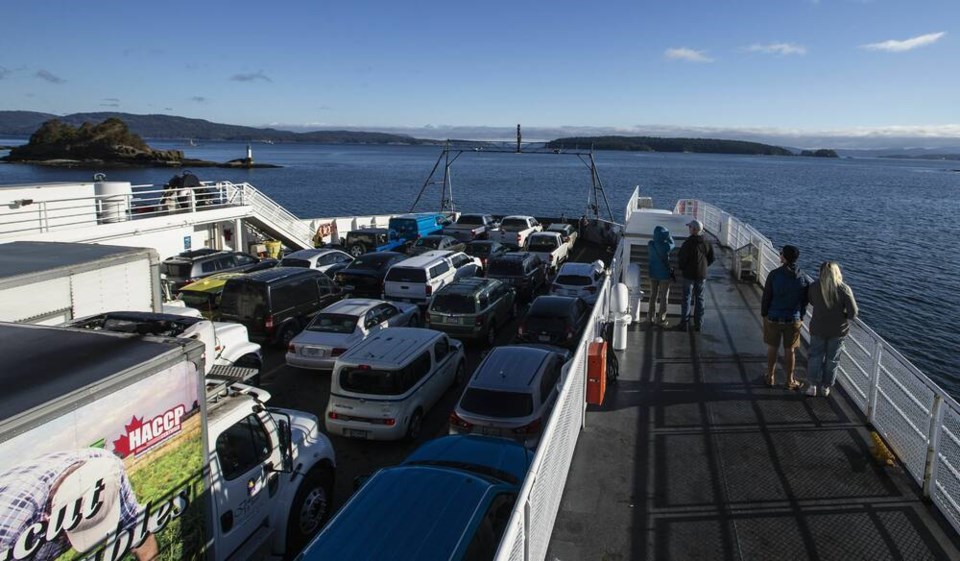As the drought deepens — about three months now with only scant traces of rain — my wife and I do as always: flush the toilet as few times as possible, take navy showers, and hand-water the garden.
Unlike those living in surrounding urban centres, Gulf Islanders cannot rely on distant watersheds. They must make do with whatever precipitation falls on their little piece of terrain.
Water scarcity is a major reason the islands cannot be developed like any other area.
Another consideration is legislative. The Islands Trust Act was passed by the provincial government in 1974 to protect the Gulf Islands’ fragile ecosystems from overdevelopment. It created the Islands Trust with a mandate to “preserve and protect the Trust Area and its unique amenities and environment for the benefit of residents of the Trust Area and the province generally.”
In 1974, the spirit and intent of those words was probably clear to everyone. But today, as people pressure mounts, the interpretation is being challenged by those who want fewer restrictions.
They argue that “environment” refers not just to the natural environment, but also the one created by humans, and that “unique amenities” covers everything from shops and ferries to subdivisions.
Last year, trustees from all 13 major islands voted 17-8 against a motion to prioritize environmental protection in the new draft policy statement, the umbrella document that will shape the future of the islands.
This happened despite many months of public consultation showing the vast majority of respondents valued the natural beauty of the islands above all.
Then, in yet another blow to the environment, they passed a separate motion extending the Trust’s mandate to the “protection of healthy and inclusive communities including, but not limited to, housing and transportation.”
In that moment, everything became a priority and the Islands Trust lost its special conservation-oriented focus.
Trust council hoped to adopt a new policy statement this term, but the public consultation process was prolonged amid ongoing controversies about restrictions, and time ran out. This means the wording of the new document — and the fate of the islands — will be determined by trustees elected on Oct. 15.
The Trust’s identity crisis was confirmed by a recent governance review report. It described how trustees can’t agree on the meaning of the mandate, and noted “there is no comprehensive analysis of the Trust Area’s capacity to sustain current population and activity, or its ability to accommodate more growth and development, especially in light of climate change and other considerations.”
The freedom afforded trustees to pick and choose priorities was revealed by the recent approval of a major tourist resort at Fulford Harbour on Salt Spring.
The Local Trust Committee, which includes Peter Luckham, chair of Trust Council, and Laura Patrick, who has campaigned to keep interpretation of the mandate “as broad as possible,” approved the development permit despite repeated warnings from their own experts that the project, between two fish- bearing streams, could pollute the marine environment.
Trustees dismissed a hydrologist report labelling the site “coastal flood hazard land” unsuitable for a septic system, and didn’t even discuss the Trust’s Climate Emergency Declaration passed in 2019.
Then came proposed Bylaw 530 to blanket rezone most of Salt Spring to allow for thousands more suites and full-time cottages. The bylaw has been widely criticized for violating basic principles of the Official Community Plan, and having long-term deleterious effects while providing few benefits in terms of affordable housing.
Trust lawyers said the bylaw requires an OCP amendment, but trustees decided to skip that crucial step — one that would have triggered a broader discussion about carrying capacity, settlement patterns, strategies for dealing with a never-ending housing crisis, and Islands Trust responsibilities. Only a letter of concern from Tsawout First Nations put the bylaw on pause.
Adam Olsen, MLA for Saanich North and the Islands, says the provincial speculation and vacancy tax should be extended to Salt Spring to help alleviate the housing crisis, and that increasing densities on the island should be strictly limited because of water scarcity.
The future of the islands should not be left to the devices of individual trustees. It’s up to the province to decide if the Gulf Islands are a provincial treasure that needs to be protected in perpetuity, and if so, to tighten the wording of the act and ensure the mandate is properly implemented.
On Oct. 15, voters in the Trust Area must go to the polls with one question in mind: Who will help save the Islands Trust?
>>> To comment on this article, write a letter to the editor: [email protected]



